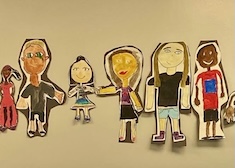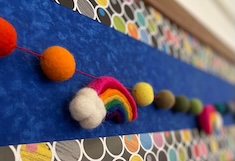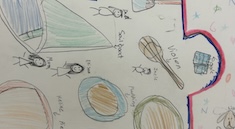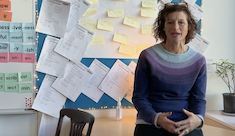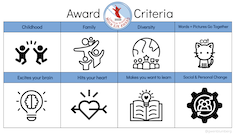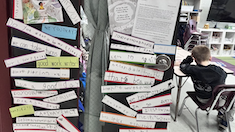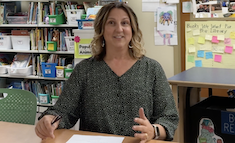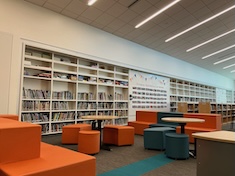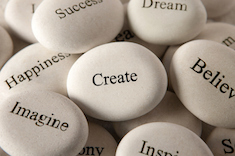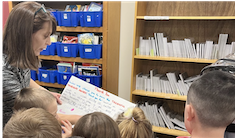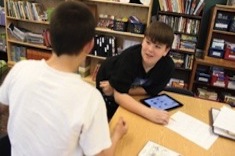Community Building
It's one of the big paradoxes of literacy instruction - students best learn how to read and write independently when they have a strong community of support in classrooms. How teachers build those thoughtful, kind, and challenging classroom communities is explained in these resources.
Latest Content
Lessons from a Bird-Watcher: How to Make Space for Students’ Passions
Students are entering our classroom with passions. Tara Barnett and Kate Mills consider how to tap students’ excitement and create space for them to share their interests as part of the learning community.
More Than a Self-Portrait
Many elementary teachers begin the school year with the creation of self-portraits. Mandy Robek carries the work from the initial creation throughout the entire school year to strengthen her learning community.
I Am a Listener Who…
Melissa Quimby challenged herself to unpack her identity as a teacher who listens. She discovered clear and repeatable actions that all educators can use to be intentional listeners. Schools become safer spaces when students feel heard. What new things might you try to create a safer space for children?
Building Trust in Our Classrooms
Tara Barnett and Kate Mills remind us that more important than the physical layout of the classroom or the assessments we’ll give is the type of community we’ll become. Building a brave and enthusiastic community of learners is the foundation that everything else stands on. They share a community-building experience that can be adapted for any age.
Creating a Space
Gwen Blumberg clearly outlines different kinds of spaces for our classrooms and libraries. She was inspired by David Thornburg’s Learning Space model where he suggests creating campfires, watering holes, and caves to support different kinds of learning.
What Would You Do?
Tammy Mulligan uses role-play to help her class process different ways to respond to challenging behavior situations. In this video clip, Tammy shares the rationale behind this practice and gives us a glimpse into her students role-playing a situation and their conversations about possible responses.
And the Winner Is… Planning and Implementing a Mock Book Award
Gwen Blumberg shares a school-wide approach to a mock book award experience. This clear step-by-step guide with a rich resource download makes it possible to implement in any school.
Letting Go and Trusting Students
Becca Burk turned to her students when her class needed an idea for a school-wide door-decorating contest. She was reminded of the importance of trusting students and uplifting their voices.
Say Cheese: Sharing Photos to Increase Family and Student Engagement
Most teachers have, at some point, taken a picture of their class or a particular student and shared that photo with a family, but what if teachers became more intentional about taking and sending pictures? Tiffany Abbott Fuller gives practical ideas for using photos to increase family engagement.
Community Circle
Bitsy Parks reminds us of the importance of taking time to talk, ask questions, and share thinking in a circle format. Community circle is a practice that strengthens an inclusive community.
Welcome, Everyone!
When Gigi McAllister says the library is a place for everyone, she means everyone! As a child Gigi did not like reading, so she is passionate about creating a space in the library where everyone feels like they belong.
Whole-School Animal Research
Gigi McAllister shares an annual school-wide research project she leads in the library. You’ll be inspired by the way a focus on research can bring joy and belonging to all students in all grades.
Quick Take: A Classroom of Belonging
Tammy Mulligan shares the first steps to help students develop a sense of belonging in the classroom.
Uplifting Independent Reading in the Living Room
Gwen Blumberg offers ways to make the library a welcoming space for readers to settle in with their choice of books. Classroom teachers can consider creating a living room, too.
I’m an Everything Person!
Bitsy Parks writes about the connection between identity and engagement, offering small steps to help all students believe in themselves as learners.
Indoor Walks
Gigi McAlister discovered that using indoor walks is a way to help students engage in their learning and strengthen their learning community through conversations.
Responding to Dysregulated Behaviors: What About the Other Kids?
Becca Burk reflects on the other kids in the classroom who witness dysregulated behaviors from a classmate. She reminds us of the way grace and acceptance are prominent when we look for the silver linings in difficult situations. This is the third installment of a four-part series chronicling the responses when a student with dysregulated behaviors joins Becca Burk’s kindergarten class mid-year.
Responding to Dysregulated Behaviors: A Symptom of What?
When a new student spirals into anxiety and becomes aggressive, Becca Burk finds herself with a dislocated knee and advocating for the student to return to the classroom. This is the second installment of a four-part series chronicling the responses when a student with dysregulated behaviors joins Becca Burk’s kindergarten class mid-year.
A Poetic Beginning
Tara Barnett and Kate Mills use poetry to help students discover writing ideas. Inspired by three poems, students share their notebook entries and poems from the first days of a new school year.
Let’s Begin
Gwen Blumberg reflects on the community developed at a writing retreat and encourages teachers to consider the community of learners they will intentionally nourish this school year.
Do I Belong?
Tammy Mulligan considers ways to help students feel and know that they belong in the classroom community. The more we broaden our knowledge of others, and discover more about who we are and what we care about, the more our sense of belonging can grow.
Revisiting: Getting to Know My Students
Mandy Robek decided that despite the increasing pressures and time-consuming expectations, she will nourish healthy relationships with students. Here are some tried-and-true practices that she wants to maintain.
Fostering Reading Lives in the Library
Gigi McAllister fosters engaged reading lives through goal-setting in the library. She shares ways we can encourage all readers to have robust reading lives.
Advice from Hanks
Becca Burk shares three tips Tom Hanks gave to educators during a keynote address at NCTE. If you’re looking for inspiration, this is just the article for you!
The Power of Story
Becca Burk reminds us of the power of story and community when she uses a social story to help a kindergartner overcome the fear and anxiety from being forgotten on the bus. Becca shows us how to use a social story to develop confidence to overcome difficulties.
Morning Message 2: Routine and Community
Ruth Metcalfe reminds us of the power of routines and shows how over the course of time, morning message is an anchor in her first-grade classroom community.
The Language We Use and How It Strengthens Understanding
Suzy Kaback explores the importance of the way teachers use language and invite kids to use theirs. It is the key to knowing ourselves, tuning in to others, and understanding the larger world.
QuickTake: Grading Student Writing
Ruth Ayres shares a process for grading student writing that improves efficiency and accuracy.
Do the Hard Thing
Becca Burk reminds all of us that one of the important parts of being a teacher is helping students believe they are capable. Becca shares three practical ways to uplift student capability.
Rural Communities
Julie Cox explores the differences in her experiences of teaching in the city of Louisville and teaching in a rural community. All teens have similar universal experiences, yet Julie outlines some considerations for rural students.
Browse Content By
Type
Category
- Assessment Tools
- Big Fresh Archives
- Booklists
- Choice Numeracy
- Classroom Design
- Common Core
- Community Building
- Conferring
- Content Literacy
- Digital Literacy
- English Language Learners
- Equity
- Family Relations
- Free Samples
- Guiding Groups
- Leadership
- Literacy Coaches
- Mentor Texts
- Minilessons
- New Teacher Mentors
- Podcasts
- Poetry
- Quote Collections
- Reading Strategies
- Self Care
- Struggling and Striving Learners
- Talking and Listening
- Teacher Study Groups
- Teaching Reading
- Teaching Writing
- Word Study and Vocabulary
Author
- Melissa Quimby
- Nawal Qarooni
- Gwen Blumberg
- Julie Cox
- The Lead Learners
- Hannah Tills
- Josie Stewart
- Ruth Metcalfe
- Mallory Messenger
- Becca Burk
- Jodie Bailey
- Vivian Chen
- Mary Brower
- Tiffany Abbott Fuller
- Stephanie Affinito
- Ruth Ayres
- Leigh Anne Eck
- Heather Fisher
- Shari Frost
- Julie Johnson
- Suzy Kaback
- Gigi McAllister
- Shirl McPhillips
- Melanie Meehan
- Cathy Mere
- Debbie Miller
- Tara Barnett and Kate Mills
- Tammy Mulligan
- Dana Murphy
- Bitsy Parks
- David Pittman
- Brenda Power
- Heather Rader
- Matt Renwick
- Mandy Robek
- Christy Rush-Levine
- Gretchen Schroeder
- Jen Schwanke
- Brian Sepe
- Katherine Sokolowski
- Stella Villalba
- Jennifer Vincent
Grade Level
Choice Literacy Membership
Articles
Get full access to all Choice Literacy article content
Videos
Get full access to all Choice Literacy video content
Courses
Access Choice Literacy course curriculum and training


